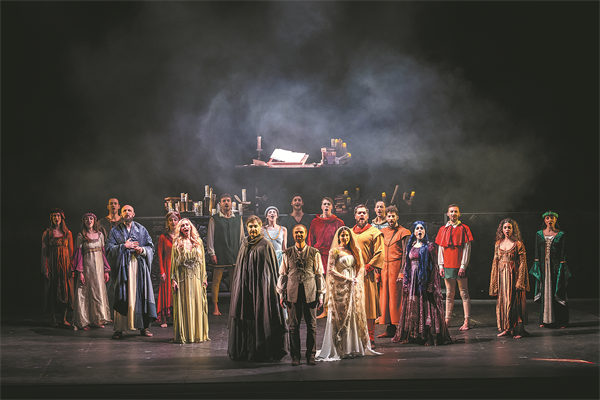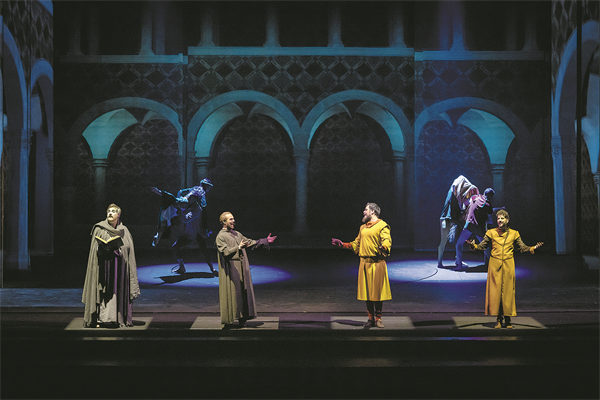
The Divine Comedy Musical, adapted from the world-famous epic masterpiece La Divina Commedia (The Divine Comedy) by Italian writer Dante Alighieri, will tour China this year while celebrating the 55th anniversary of diplomatic relations between China and Italy.
Kicking off in Chongqing on Friday, the tour will visit 15 cities including Beijing, Shanghai, and Guangzhou in Guangdong province, with a total of 57 performances.
"The magic of the musical is that it doesn't just tell a story about Dante's journey, it invites the audience on their own journey," says Andrea Ortis, the director of the musical, in Beijing on Monday. "The audience is introduced to Dante not as a figure of the past, but as someone whose inner turmoil, struggles, and eventual redemption, are deeply timeless and human. The musical is like a bridge, allowing modern viewers to step into Dante's shoes and feel the journey through their own lives."
ALSO READ: A symphony of celebration
The Divine Comedy, written in the early 14th century, is one of the most significant literary works in Western literature. First staged in 2007, the production uses a rich repertoire to reimagine Dante's profound reflections on the human soul and fate, taking audiences through hell, purgatory and paradise. It combines classical music with modern rock elements and seamlessly integrates cutting-edge 3D technology and dynamic projections for an unprecedented visual and auditory experience.
Composed by Marco Frisina and written by scriptwriter Gianmario Pagano, the musical opens with a striking, rock-infused hell, where the roar of electric guitars intertwines with percussion to portray the intense struggles of the soul. Purgatory evokes a softer, more introspective mood through delicate melodies and harmonies.
This section represents repentance and the potential for rebirth, with the music becoming more reflective and emotive as the rhythm slows, giving the audience a sense of spiritual healing and redemption. Paradise, the finale, soars to a magnificent conclusion with operatic arias and sweeping orchestral arrangements. The fusion of high notes and orchestral grandeur creates a celestial atmosphere, lifting the audience toward divine enlightenment.
READ MORE: Staging a heavenly commotion
For Tian Hui, artistic director of We Opera, a Hong Kong-headquartered company bringing this Italian opera to China, what touched her first was the music, then the story of Dante, a man who "is no longer just a medieval poet. He becomes a mirror to the audience's spiritual journey, whether they are struggling with doubts, seeking redemption, or pursuing their life's purpose," she says.

"Musical theater is a popular art form among Chinese audiences, especially the younger generation. It also plays a growing role in cultural development and international exchange," says Tian. "Through the musical's use of cutting-edge technology, vibrant projections and powerful soundscapes, Dante's internal journey becomes deeply tangible."
The cast includes eight acclaimed Italian singers, including Antonello Angiolillo in the role of Dante and Myriam Somma as Beatrice (a woman Dante is believed to have met in his youth and deeply admired). Dancers and acrobats, along with over 200 stage costumes, help bring this grand production to life.
"As an Italian creation, The Divine Comedy Musical is more than just a stage adaptation of a literary masterpiece. It serves as a cultural expression and a bridge between Italy and the world. Now, the musical is making its way to China, symbolizing the artistic and cultural exchange between the two countries," says Gabriele Gravina, the musical's main producer.
READ MORE: Iconic play returns to stage
Gravina adds that the relationship between China and Italy is rooted in a history of cultural and economic exchanges spanning over a thousand years.
"More than 700 years ago, Italian explorer Marco Polo journeyed through China, bringing Eastern civilization to the West and fostering mutual understanding between the two nations. I hope that the musical, with me as its producer, will serve as a messenger and witness of cultural exchange in the new era, promoting deeper interaction between Chinese and Italian civilizations," he says.


